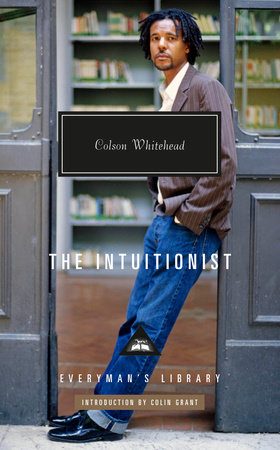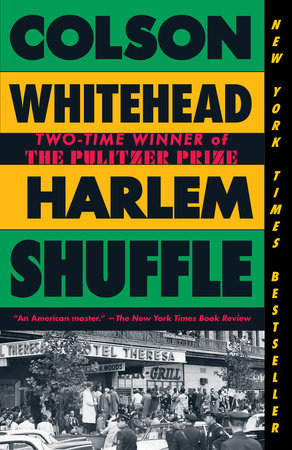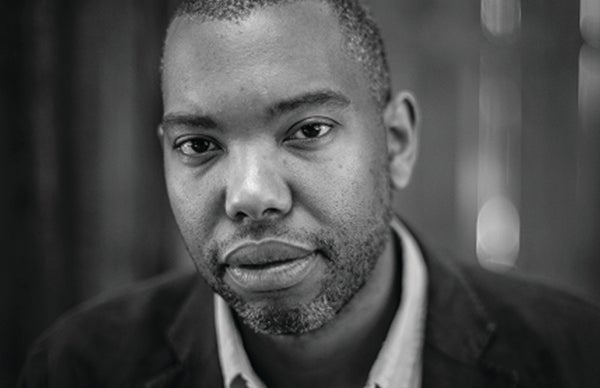Colson Whitehead
Pulitzer Prize and National Book Award-winning author of The Underground Railroad and The Nickel Boys

Photo Credit: Chris Close
-
About Colson Whitehead
Colson Whitehead is the critically acclaimed, #1 New York Times–bestselling author of eleven works of fiction and nonfiction, including The Underground Railroad (winner of the 2016 National Book Award and 2017 Pulitzer Prize for Fiction) and The Nickel Boys (winner of the 2020 Pulitzer Prize for Fiction). When selecting it as an Oprah Book Club pick, Oprah Winfrey raved, “From the first page of Colson Whitehead’s extraordinary novel The Underground Railroad, I knew I was reading something ground-shifting.” Whitehead’s most recent novels, Harlem Shuffle and Crook Manifesto, are the first two installments of a trilogy set on the streets of New York City in the 1960s and 1970s. The hugely entertaining stories offer hilarious morality plays, incisive commentary on race and power, and ultimately read as a love letter to Harlem. Several of Whitehead’s novels have been adapted for TV and film, including producer Barry Jenkins’ Underground Railroad limited TV series on Amazon, MGM Orion’s film adaptation of The Nickel Boys, and HBO Max’s TV series on Sag Harbor.
Time magazine named Whitehead one of the “100 Most Influential People” in 2017, the Library of Congress awarded him the Prize for American Fiction in 2020, and in 2021 he received the National Humanities Medal from President Biden for his contributions “as an American literary icon.” His cultural impact continues to grow with each new book. A dynamic speaker, Whitehead lectures with his characteristic honesty and wit. He is a winsome storyteller who enthralls audiences with anecdotes about his diverse bibliography, irreverent “Rules for Writing,” and his unique approach to every novel.
A 2016 National Book Award winner, The Underground Railroad is a magnificent tour de force that chronicles a young slave’s journey during a desperate bid for freedom in the antebellum South. The novel offers a shattering meditation on the United States’ complicated political and racial history. Whitehead’s 2019 book, The Nickel Boys, is an exploration of life under Jim Crow told from the perspective of two boys in one of the country’s most notorious real-life juvenile correction institutions, the Arthur G. Dozier School for Boys, located in the Florida panhandle. This meticulously researched and searing novel was an instant New York Times bestseller, won the 2020 Pulitzer Prize in fiction, and was longlisted for the 2019 National Book Award and nominated for The National Book Critics Circle Award.
Whitehead is also the author of The Intuitionist, John Henry Days, The Colossus of New York (a book of essays about the city), Apex Hides the Hurt, Sag Harbor, Zone One, and The Noble Hustle. His writing has appeared in The New York Times, The New Yorker, New York Magazine, Harper’s, and Granta, among other publications. A PEN/Faulkner Award finalist and recipient of the Carnegie Medal for Fiction, the Kirkus Prize, and the Orwell Prize for Political Fiction, Whitehead also received both a MacArthur Fellowship and a Guggenheim Fellowship. He has taught at universities across the country and he lives in New York City.
Contact us to learn more about booking Colson Whitehead for your next event.
-
Speaking Topics
Revisiting History
In his thought-provoking and witty talks, Colson Whitehead discusses the inspirations for his acclaimed novels and how he came to write those stories—from the secret lives of elevators, to the Underground Railroad and slavery in the antebellum South, to life under Jim Crow at one of the country’s most notorious juvenile correction institutions, to the streets of Harlem in the 1960s and 1970s. Throughout his lectures, Whitehead deals frankly and powerfully with the complexities of revisiting historic and cultural events and their continuing relevance today. His incisive commentary inspires audiences amidst entertaining stories, readings, and ideas for future books.
Becoming a Writer
Colson Whitehead gives audiences a humorous introduction to the writing life, beginning with a tour through the many failures and setbacks that marked the beginning of his career. Drawing on his irreverent “Rules for Writing” originally published in The New York Times Sunday Book Review, Whitehead teases fresh advice from the well-used adages on craft with which we are all familiar, and he closes this lecture with a short reading from one of his many books.
Categories: Bestselling Author Speakers, Black History Month Speakers, College + University Speakers, Commencement + Convocation Speakers, Company Reads Speakers, Film and TV Adaptation Speakers, First-Year Experience Speakers, Library + Community Reads Speakers, Literary Fiction Speakers, MacArthur Fellow Speakers, Pulitzer Prize-Winning Authors, Social Justice Speakers -
Video
-
Praise for Colson Whitehead
Colson Whitehead didn’t just do a reading, he presented a bravura performance full of wit and wisdom. A true delight.
— Vassar CollegeHe was absolutely amazing. Perhaps the best speaker we’ve had!
— Columbus LibraryColson was easy to work with and great on stage. His presentation was interesting and humorous. Our audience was laughing out loud. Colson and his works were a great draw. I would highly recommend him for similar events.
— Oklahoma State University LibrariesColson was a delight. We received tons of feedback from faculty, staff, students, and the local community. Everyone raved about his presentation, saying things like, “He was hilarious!” “No wonder his books are so good,” and “best Weis Lecture ever.”
— Bucknell University[Colson] did a marvelous job! Everyone just loved it.
— Colby CollegeHe was great! Very funny and entertaining.
— Library Foundation for Sarasota CountyHe was wonderful. His talk was ingeniously structured in a compelling arc that balanced disarming, self-effacing humor and candid insights into his own creative process with lucid observations about the historical and current societal forces and conditions that have framed his life and work. The consensus among audience members I talked to was that it was utterly transporting and a privileged, intimate encounter with a beloved artist.
Part of Colson’s appeal and effectiveness as a speaker is the moral force generated by the respect he shows for his audiences. He clearly assumes empathy, intelligence, curiosity and good faith as baseline traits in his listeners, and seems averse to telling people how to feel. As I saw it, that modesty created a trusting rapport with audiences that enabled them to identify easily with his perspective and respond to him on a personal level, which is rare with speakers of his stature. This was especially valuable during his conversations with student groups at UGA and Cedar Shoals High School, which I hope he enjoyed – I know that they did, immensely.
— UGA Willson Center for Humanities and ArtsColson was wonderful. His talk was ingeniously structured in a compelling arc that balanced disarming, self-effacing humor and candid insights into his own creative process with lucid observations about the historical and current societal forces and conditions that have framed his life and work.
— UGA Willson Center for Humanities and ArtsTruly memorable. The best speaker we had in our ten year speaker series.
— Mt. Lebanon Public LibraryAmazing. Brilliant. Funny. So accessible that students, faculty, staff, and the community are raving about him. Even our local high-school students are engaging with The Nickel Boys more than they have with our other books.
— University of Arkansas, Fort SmithHe was brilliant, beloved, generous. A smashing success. His talk was superb, funny, self-deprecating, smart.
— Martha McPhee, Curator of Hofstra’s Great Writers, Great Readings SeriesColson is a wonderful storyteller, and very funny. He was engaging and gracious and his insight and thoughtful discourse with both the students and the audience were impressive. Was such a pleasure to host him here at Scripps!
— Scripps CollegeColson was very well received by the campus community – our MFA students who interviewed him could hardly get words out, they were so excited, and he could not have been more gracious with them. I was told by many colleagues and students that his talk at our banquet was one of the very best we have ever had. I think it’s fair to say the entire community was star-struck.
— Purdue UniversityThere is no way to encapsulate the power of Colson’s talk, except to say that while people were really laughing at his description of the writing life and the issues he faces as a writer, they were also very involved in his reading and the heaviness of the topics presented in The Underground Railroad — the audience was present for a complete literary and cultural experience. Colson was gracious and poised through it all, and we are indebted to him for his engagement with all of us.
— Shasta CollegeI believe this event has been the most successful out of all the authors I have brought to the library. Colson was a wonderful speaker, and it was a pleasure to be the one to escort him through the event. I also immensely enjoyed his talk and found myself bursting out laughing several times at his humor while feeling the deeper message of encouragement he sent through his stories and advice about writing.
— Champaign Public LibraryColson was great! He was very generous with his time and attention. Everything went on schedule and all was well. His talks were all quite interesting and he answered all questions with lively responses. He’s very funny.
— Memphis ReadsThe event was amazing. Truly one of my favorites ever.
— Lannan Foundation, Lannan Foundation“It was a truly stellar and deeply moving night on so many levels.”
— Center for the Art of Performance, UCLAColson’s visit was a wonderful success! I was especially impressed with how well he engaged a multi-generational audience. Beautiful mix of autobiography, craft-talk, social activism, comedy, and drop dead gorgeous writing. Colson’s generosity was quite remarkable for one of his stature, his visit meant so much to us. A fantastic event all around!
— Hamilton CollegeColson’s talk last night was the most brilliantly crafted and delivered talk I’ve heard. Our students were enthralled and haven’t stopped talking about him since. He immediately put pressure on and subverted all the narratives we expect to hear and did so hilariously. He interspersed readings from The Underground Railroad, allowing the power of his writing to stand by itself. It was a day that will resonate for a very long time at our school and in the lives of our students.
— St. Andrew’s SchoolWe were thrilled with Colson Whitehead’s appearance over the last two days with Pen Pals. He’s a rare and talented speaker who deeply engages his audience, dares them to face harsh realities, and then turns on a dime charming them with his abundant sense of humor. He pushed our Minnesotan boundaries in all the right ways, and the crowd loved him for it. So, Bravo Colson (who was duly thanked on his way out this afternoon) and thank you to Penguin Random House Speaker’s Bureau for sharing this national treasure with us!
— Friends of the Hennepin County Library“Colson was AMAZING. We had a completely full house and even some people who couldn’t get a seat but waited in the lobby for the book signing. The audience absolutely loved him, he was so engaging. The event was a complete success.”
— George Mason University, Fall for the Book Festival“I’m still basking in the glow of a truly spectacular event! Colson was an enormous hit. I’m sure I don’t have to tell you what a gifted speaker he is; honestly, the man could have had a career as a stand-up comedian—his material is strong and timing impeccable! And he reads his work masterfully. Given the disturbing, often grim content of his book, I think it was a welcome surprise to people that he used humor to lead into the evening. He was engaging and gracious with the people who had books signed. His visit with the undergraduate students was a unique opportunity for them to converse with him about his work, his process, and get his advice. I know the students were inspired by what he shared about this own journey as a writer and just his overall kindness. His work aside, just his presence and demeanor as a human being was a great example of how to graciously handle fame.”
— Butler UniversityIt was a really wonderful event. Colson was so gracious and generous to our community and really engaged with people who waited to have a book signed afterward. The audience really loved Colson’s presentation. He had a great blend of his own story (with some unexpected, but very welcome humor) and the story of The Underground Railroad. It was the best author presentation I’ve heard and everyone I spoke with loved it.
— Bexley Public LibraryIt would be an understatement to say that Colson was “well-received” by the audience. Many people in the audience said it was one of the finest literary events they’ve attended in years and felt privileged to receive a ticket. I couldn’t agree more with their assessment. I must say Colson delivered a masterful performance Thursday evening. He began his remarks with an artfully delightful, self-deprecating monologue describing his evolution as a writer. It was so funny and insightful that he may have convinced a few staid businessmen to give up their careers to join him as a writing disciple. Colson is a gracious, independent guest and we would be honored to invite him back in a few years to discuss his future projects.
— New Orleans Public LibraryIt was a fantastic lecture! His talk touched on so many emotions. I laughed hysterically at his intellectual humor. I grimaced while remembering graphic details from the novel. I honestly walked away inspired.
— Virginia Commonwealth UniversityPraise for Crook Manifesto
Whitehead’s New York of the ‘70s is a fully realized universe down to the most meticulous details (Parts of Crook Manifesto”would pair nicely with Robert Caro’s The Power Broker”)… Crook Manifesto and Harlem Shuffle also form a joint reminder, as if we still needed one, that crime fiction can be great literature. These books are as resonant and finely observed as anything Whitehead has written. They have the pulpy verve of Harlem’s crime fiction godfather, Chester Himes, combined with the literary heft of Whitehead’s more garlanded novels.
— Los Angeles TimesA dazzling sequel to Harlem Shuffle … Two-time Pulitzer-winning author Whitehead shows no sign of resting on his laurels. Crook Manifesto continues the brilliantly realized sequence that began with Harlem Shuffle, intricately depicting cultural history and family drama with the compelling energy of a crime thriller and the sharp wit of social satire. Harlem itself is one of the lead characters, and there are echoes of other chroniclers of this burg such as James Baldwin and Chester Himes. In ambition and scope, in the way the intimate is so deftly weaved with the epic, one is also reminded of Balzac. Whitehead has embarked on a great comédie humaine of his own.”
— The Guardian[A] masterwork of stylish noir and social satire … Whitehead’s larger project propels us forward, probing the whipsaw of race and the ouroboros of virtue and vice.”
— Star TribunePraise for Harlem Shuffle
A cool, funny, slyly elegant genre outing that deftly weaves in weightier themes around the edges of a story about crooks and schemers in mid-20th-century New York.
— Laura Miller, SlateColson Whitehead has a couple of Pulitzers under his belt, along with several other awards celebrating his outstanding novels. Harlem Shuffle is a suspenseful crime thriller that's sure to add to the tally — it's a fabulous novel you must read.
— NPR.orgA warm, involving novel
— The Wall Street JournalA rich, wild book that could pass for genre fiction. It’s much more, but the entertainment value alone should ensure it the same kind of popular success that greeted his last two novels, The Underground Railroad and The Nickel Boys.
— Janet Maslin, The New York Times“A a fiendishly clever romp, a heist novel that’s also a morality play about respectability politics, a family comedy disguised as a noir…Harlem Shuffle reads like a book whose author had enormous fun writing it. The dialogue crackles and sparks; the zippy heist plot twists itself in one showy misdirection after another. Most impressive of all is lovable family-man Ray, whose relentless ambition drives the plot forward while his glib salesman’s patter keeps you guessing about his true intentions. This book is a blast that will make you think, and what could be better than that?”
— VoxAnother triumph from Pulitzer winner Whitehead
— People MagazineFast-paced, keen-eyed and very funny, Harlem Shuffle is a novel about race, power and the history of Harlem all disguised as a thrill-ride crime novel.
— San Francisco ChronicleEnthralling, cinematic…Whitehead's evocation of early 1960s Harlem — strewn with double-crosses and double standards, broken glass and broken dreams — is irresistible…a valentine to a time and place.
— Minneapolis Star-TribuneDazzling…exciting and wise.
— The Boston GlobeIt’s a superlative story, but the most impressive achievement is Whitehead’s loving depiction of a Harlem 60 years gone—‘that rustling, keening thing of people and concrete’—which lands as detailed and vivid as Joyce’s Dublin. Don’t be surprised if this one wins Whitehead another major award.
— Publishers Weekly, Starred ReviewWhitehead adds another genre to an ever-diversifying portfolio with his first crime novel, and it’s a corker. Ray Carney owns a furniture store in Harlem. When the novel begins in 1959, he’s selling mostly used furniture, struggling to escape the legacy of his criminal father. ‘Living taught you,’ Ray believes, ‘that you didn’t have to live the way you’d been taught.’ Almost. Ray’s ne’erdo-well cousin, Freddie, who’s been luring Ray into hot water since childhood (‘I didn’t mean to get you in trouble,’ is Freddie’s constant refrain) regularly brings Ray the odd piece of jewelry, provenance unknown, which Ray peddles to a dealer downtown, building a stake to invest in his business. ‘There was a natural flow of goods in and out and through people’s lives . . . a churn of property, and Ray facilitated that churn.’ It works until Freddie suggests Ray as a fence for a jewel heist at the Hotel Theresa (‘the Waldorf of Harlem’), and suddenly the churn produces a potentially disastrous backwash. Following Ray as his business grows and he delicately balances the crooked and straight sides of his life, Whitehead delivers a portrait of Harlem in the early ’60s, culminating with the Harlem Riot of 1964, that is brushed with lovingly etched detail and features a wonderful panoply of characters who spring to full-bodied life, blending joy, humor, and tragedy. A triumph on every level.
— Booklist, Starred ReviewA spectacularly pleasurable read, and while it is, of course, literary, it’s also a pure, unapologetic crime-fiction page-turner.
— Los Angeles TimesHarlem Shuffle is a wildly entertaining romp. But as you might expect with this two-time Pulitzer Prize winner and MacArthur genius, Whitehead also delivers a devastating, historically grounded indictment of the separate and unequal lives of Blacks and whites in mid-20th century New York.
— Associated PressAn American master.
— New York Times Book ReviewPraise for The Nickel Boys
Not a moment is wasted, and for someone who writes as vividly as Whitehead, there’s also a graceful economy here. He uses words carefully, as if he doesn’t want them to get in the way of the truth he’s excavating.
— Boston GlobeThe Nickel Boys often feels like Whitehead’s conversation with both the idealistic forerunners of the civil rights generation and…the woke youth of today.
— Laura Miller, Slate.comTHE NICKEL BOYS is in conversation with works by James Baldwin, Ralph Ellison and especially Martin Luther King.... It shreds our easy confidence in the triumph of goodness and leaves in its place a hard and bitter truth about the ongoing American experiment.
— Ron Charles, The Washington PostPropulsive and gorgeous and completely devastating.
— LitHub.comThe Nickel Boys is a chilling, masterful novel that explores the depths of evil and the resilience of the human spirit. Whitehead's prose is dazzling, and the narrative's nimble twist is a swift kick to the solar plexus.
— The Minneapolis Star-Tribune[A] powerful narrative...grips us from the very first line.
— Pittsburgh Post-GazetteThe Nickel Boys' is a literary achievement. Will Colson Whitehead win another Pulitzer? “The Nickel Boys” is straight-ahead realism, distinguished by its clarity and its open conversation with other black writers: It quotes from or evokes the work of Langston Hughes, James Baldwin, Ralph Ellison and more. Whitehead has made an overt bid to stand in their company – to write a novel that’s memorable, and teachable, for years to come. “The Nickel Boys” is its fulfillment.
— USA TodayStellar…heartbreaking...a beautiful, unforgettable young hero who walks right off the page and into your heart…If you have been thinking you should read Colson Whitehead, The Nickel Boys is the perfect place to start.
— NewsdayA tense, nervy performance, even more rigorously controlled than its predecessor. The narration is disciplined and the sentences plain and sturdy, oars cutting into the water. Every chapter hits its marks.
— Parul Seghal, The New York TimesAmerica's storyteller...A book that will further cement his place in the pantheon of influential American writers.
— Time Magazine, cover storySpry and animated and animated and seamed with dark humor, true to the irrepressible curiosity of its teenage protagonists...the control and craft of THE NICKEL BOYS demonstrate the versatile gifts of a writer who is rounding into mastery....[Whitehead] has made himself one of the finest novelists in America.
— Sam Sacks, The Wall Street JournalPraise for The Underground Railroad
I haven’t been as simultaneously moved and entertained by a book for many years. This is a luminous, furious, wildly inventive tale that not only shines a bright light on one of the darkest periods of history, but also opens up thrilling new vistas for the form of the novel itself.
— Alex Preston, The GuardianPerfectly balances the realism of its subject with fabulist touches that render it freshly illuminating.
— TIMEWhitehead’s novel unflinchingly turns our attention to the foundations of the America we know now.
— Elle[An] ingenious novel. . . . A successful amalgam: a realistically imagined slave narrative and a crafty allegory; a tense adventure tale and a meditation on America’s defining values.
— Minneapolis Star TribuneWhitehead is a writer of extraordinary stylistic powers. . . . [The Underground Railroad] offers many testaments to Whitehead’s considerable talents and examines a deeply relevant and disturbing period of American history.
— The Christian Science MonitorSingular, utterly riveting. . . . You’ll be shaken and stunned by Whitehead’s imaginative brilliance. . . . The Underground Railroad is a book both timeless and timely. It is a book for now; it is a book that is necessary.
— BuzzFeedBrilliant. . . . An instant classic that makes vivid the darkest, most horrific corners of America’s history of brutality against black people.
— HuffPostMasterful, urgent. . . . One of the finest novels written about our country’s still unabsolved original sin.
— USA Today[Whitehead] is the best living American novelist.
— Chicago TribuneThe Underground Railroad enters the pantheon of . . . the Great American Novels. . . . A wonderful reminder of what great literature is supposed to do: open our eyes, challenge us, and leave us changed by the end.
— EsquireColson Whitehead’s book blends the fanciful and the horrific, the deeply emotional and the coolly intellectual. What he comes up with is an American masterpiece.
— Ann Patchett, author of Bel CantoA brilliant reimagining of antebellum America.
— The New RepublicThe Underground Railroad is inquiring into the very soul of American democracy. . . . A stirring exploration of the American experiment.
— The Wall Street JournalElectrifying. . . . Tense, graphic, uplifting and informed, this is a story to share and remember.
— PeopleWhitehead’s best work and an important American novel.
— The Boston GlobePotent. . . . Devastating. . . . Essential.
— Michiko Kakutani, The New York TimesA triumph.
— The Washington PostStunningly daring.
— The New York Times Book ReviewAn American masterpiece.
— NPRTerrific.
— Barack ObamaKept me up at night, had my heart in my throat, almost afraid to turn the next page. Get it, then get another copy for someone you know because you are definitely going to want to talk about it once you read that heart-stopping last page.
— Oprah Winfrey, (Oprah’s Book Club 2016 Selection)[A] potent, almost hallucinatory novel that leaves the reader with a devastating understanding of the terrible human costs of slavery. It possesses the chilling matter-of-fact power of the slave narratives collected by the Federal Writers’ Project in the 1930s, with echoes of Toni Morrison’s Beloved, Victor Hugo’s Les Misérables, Ralph Ellison’s Invisible Man, and brush strokes borrowed from Jorge Luis Borges, Franz Kafka and Jonathan Swift… [S]urreal elements inject the narrative with a mythic dimension… One of the remarkable things about this novel is how Mr. Whitehead found an elastic voice that accommodates both brute realism and fable-like allegory, the plain-spoken and the poetic — a voice that enables him to convey the historical horrors of slavery with raw, shocking power…. The harrowing tale he tells here is the back story to the injustices African-Americans and immigrants continue to suffer today, but the back story only in the sense, as Faulkner put it, that ‘the past is never dead. It’s not even past’… [H]e memorializes the yearning for freedom that spurs one generation after another to persevere in the search for justice — despite threats and intimidation, despite reversals and efforts to turn back the clock. He has told a story essential to our understanding of the American past and the American present.
— Michiko Kakutani, The New York Times[T]hink Toni Morrison (Beloved), Alex Haley (Roots); think 12 Years a Slave. Now here comes Colson Whitehead and with an extraordinary new take… an electrifying novel … a great adventure tale, teeming with memorable characters. At times, it's almost too sad to bear, but you'll keep reading, inspired by Cora and all the others who struggled to keep their humanity alive while trapped in America's ‘peculiar institution’ of slavery. Tense, graphic, uplifting and informed, this is a story to share and remember.
— People[M]asterful, urgent… The vivid, heart-clutching narrative of [Cora’s] escape takes care of its own implications about the enormity that is America slavery…a major American novelist… A tragic, disturbing necessity: that describes the feeling of The Underground Railroad... The result is one of the finest novels written about our country’s still unabsolved original sin.
— USA TodayFar and away the most anticipated literary novel of the year, The Underground Railroad marks a new triumph for Whitehead… The MacArthur “genius” has nimbly explored America’s racial consciousness — and more — with an exhilarating blend of comedy, history, horror and speculative fiction. In this new book, though, those elements are choreographed as never before. The soaring arias of cleverness he’s known for have been modulated in these pages. The result is a book that resonates with deep emotional timbre. The Underground Railroad reanimates the slave narrative, disrupts our settled sense of the past and stretches the ligaments of history right into our own era.
— Ron Charles, The Washington PostIngenious… Whitehead brilliantly recreates the unique terrors for black people in the pre-Civil War era, his narrative seamlessly weaves the saga of America from the brutal importation of Africans to the unfulfilled promises of the present day. The Underground Railroad is at once a kinetic adventure tale of one woman's ferocious will to escape the horrors of bondage and a shattering, powerful meditation on the history we all share.
— CBSPraise for The Noble Hustle
Astonishing. . . . Witty. . . . Tom Wolfe crossed with Tom Pynchon.
— The Washington PostHilarious. . .. Equal parts philosophical and farcical.
— The Seattle TimesPraise for Zone One
A zombie story with brains. . . . [Whitehead is a] certifiably hip writer who can spin gore into macabre poetry.
— The Washington PostWhitehead writes with economy, texture and punch. . . . A cool, thoughtful and, for all its ludic violence, strangely tender novel, a celebration of modernity and a pre-emptive wake for its demise.
— The New York Times Book ReviewPraise for Sag Harbor
He can write sentences like nobody’s business, and the deepest satisfaction in this book full of them is his crafty turn of phrase.
— Bloomberg NewsNo one writes with more acrobatic imagination and good humor about the complexities of race in America than Colson Whitehead.
— Ron Charles, The Washington Post -
Books by Colson Whitehead
-
Media About Colson Whitehead
Request Fees
and Availability
- 212 572-2013
- Colson Whitehead travels from New York, NY




















